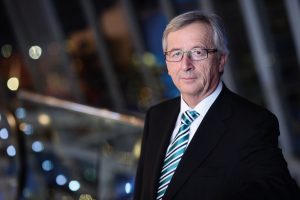Jean-Claude Juncker: Holding the EU’s Ground

Jean-Claude Juncker President of the European Commission
The butt of many jokes – not all of them in good taste – and a man who some love to hate, Jean-Claude Juncker has grown a thick skin and is not easily perturbed as he goes about defending the “magnificent” edifice Europe built over two generations.
In fact, the president of the European Commission has pretty much seen it all during a career spanning 30 years in politics. In Brussels, Juncker was initially dismissed as a lightweight, and hence inoffensive, bureaucrat from tiny Luxembourg. He reached the top by proving his critics wrong.
What makes Jean-Claude Juncker endearing is his irrepressible and rather droll sense of humour, which pops up unexpectedly and often defuses tension. However, no-one can “play nice” all the time, and Juncker is no exception.
Early October, the commission president lashed out at those who suggested that the EU should consider sacrificing Ireland – a member state – in order to accommodate the United Kingdom over the thorny and intractable issue of Northern Ireland and its border. In no uncertain terms, and dispensing diplomatic niceties, Juncker bluntly told all who cared to listen that the EU will put Ireland first, and was not about to contemplate any solution to the border conundrum that meets with objections from Dublin.
The favourite bogeyman of the British, alongside the stoic Michel Barnier – who is in charge of the actual exit negotiations with the UK – Juncker is not always appreciated for spelling out some inconvenient truths about life. He once summarised the paradox facing all politicians: “We all know what to do, we just don’t know how to get re-elected after we’ve done it.” His ability to boil down highly complex events into just a few words is equally remarkable, such as when commenting on the rise of the far right: “The populists themselves are dangerous, but they become far more so when traditional parties adopt their proposals.”
At ease among the world’s great leaders, and not at all impressed by displays of imperial power in Washington, Beijing , Moscow, or, indeed, London, Juncker is aware that a united Europe not only sits at the top table but sets the agenda. Equally experienced at both power politics on a global scale and the behind-the-scenes manoeuvring that is a prerequisite for any diplomat representing a geopolitical footnote – such as Luxembourg – Juncker has deftly managed to keep the EU unified in the face of some of the bloc’s greatest challenges.
His performance has been all the more impressive given the fact that as commission president, he is merely charged with carrying out the policy set by the European Council, which comprises the EU’s heads of government. Within the overall framework handed down by the council, the European Commission, the union’s executive branch, enjoys considerable leeway to turn abstract ideas into solid decisions.
While his job is dead serious, Juncker is often a little bit less so. He has appeared on front pages across the world, kissing the (bald) prime minister of Belgium on the head, and hailed the arrival of Hungarian Prime Minister Viktor Orbán at a meeting by announcing: “Here comes the dictator.” He can be scathing in his criticism of those slightly less dedicated to the cause of a united Europe, calling the European Parliament “ridiculous” after only a few members showed up for a debate on Malta’s performance as the rotating chair of the EU. He doggedly held his ground, even as the EP’s president demanded respect for the institution.
Juncker is not in the business of ceding ground. It is what made him into “Mr Europe”. Some may not like his blunt style of leadership, but most respect – perhaps grudgingly – his stance on keeping the union together, and on calling recalcitrant member states into line. That said, Juncker does consider the imminent departure of the UK a defeat for the EU – and a personal failure.
Brexit is happening on his watch, and shows, if anything, that keeping an unruly group of nations together is a job even the most experienced and cunning find difficult to deliver. This also helps explain why, in the face of British demands for post-Brexits opt-ins, Juncker holds his ground.
The last thing he wants is to reward those that quit.
You may have an interest in also reading…
Dambisa Moyo: Looking From a Unique Angle
Growing up in Zambia, amid a failing economy where prospects were far from plentiful, Dambisa Moyo was constantly told that
PJ O’Rourke: One of the Last of the Gonzo Journalists
A gonzo-style journalist par excellence, PJ O’Rourke will seldom fail to tackle serious societal issues with sarcastic humour and some
Catherine Abel: Stretching the Canvas of Art Deco
A young lady from the Australian outback, determined to become part of the famed Paris art scene, Catherine Abel has

















































































